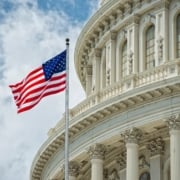The Trump Administration’s Pushback Against a Global Shipping Carbon Levy
The International Maritime Organization (IMO), the United Nations agency tasked with regulating global shipping, has proposed an international carbon pricing scheme on shipping. The maritime shipping sector has increasingly faced global scrutiny as the contributor of 3% of global greenhouse gas emissions, and IMO’s proposed mechanism would serve as the first global emissions pricing mechanism affecting the shipping sector.
President Trump has taken a firm stance against the measure — labeling it a “Global Green New Scam Tax on Shipping” and threatening sanctions and trade retaliation in an attempt to thwart the initiative — which has delayed the UN vote to October 2026. Below we unpack key aspects of the opposition, the points of tension, and what the development may mean for industry, policy, and climate governance.
The IMO Net-Zero Framework
In April 2025, 63 UN Member States endorsed a framework that would impose a carbon-intensity standard on shipping fuels and require ships over 5,000 gross tonnage to pay fees into a “net-zero fund” if they exceed those standards.
Under the proposal, ships would need to switch to lower-emission fuels or pay into the fund for each ton of excess emissions. The revenue would be earmarked to support transition to cleaner fuels, support developing states, and reward low-emission ships. The proposal is intended to create a unified regulatory scheme for international shipping rather than a patchwork approach.
United States’ Opposition
The Trump administration’s opposition to the shipping carbon levy rests on several strategic, economic, and geopolitical arguments:
- Economic Cost and Consumer Impact
The administration argues that imposing fees on shipping would raise costs for U.S. exporters/importers and consumers. It has characterized the levy as a tax that would disproportionately hurt the U.S. economy. - Threatened Retaliation
The administration threatened retaliatory measures — including sanctions, port fees, and visa restrictions — against nations that backed the levy. - Procedural Strategy
In addition to outright opposition, the administration is pushing for procedural safeguards such as requiring explicit adoption rather than an opt-out model. That approach would give the United States time to continue lobbying other countries not to accept IMO’s proposed rule.
What to Watch Going Forward
Strong U.S. pushback succeeded in delaying the IMO vote on the carbon-fee framework by one year, to October 2026. Industry members should watch whether individual countries or regions promulgate regulations of their own in the meantime, as the European Union did in 2024.
Bottom Line
The Trump administration’s campaign against IMO’s proposed fee on shipping greenhouse gas emissions illustrates how global climate policy is increasingly intertwined with trade wars and geopolitics. While the administration has delayed adoption of the measure, other countries may continue to push to decarbonize shipping. Without a single, clear framework, industry will be left to grapple with regulatory uncertainty and a patchwork of regulations across countries.
This post is as of the posting date stated above. Sidley Austin LLP assumes no duty to update this post or post about any subsequent developments having a bearing on this post.


